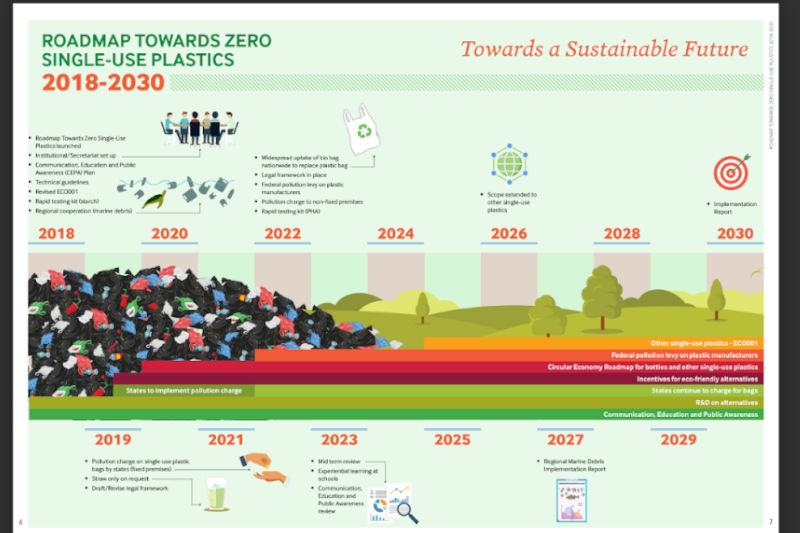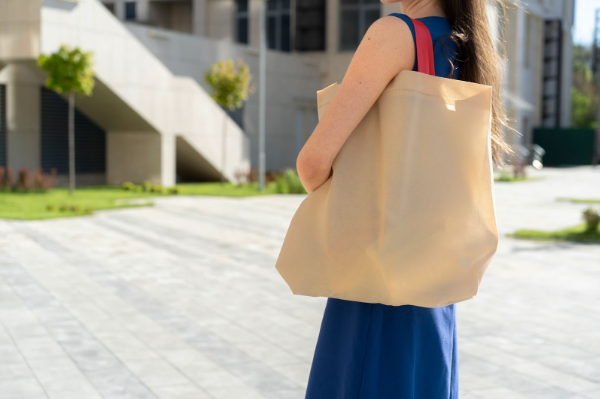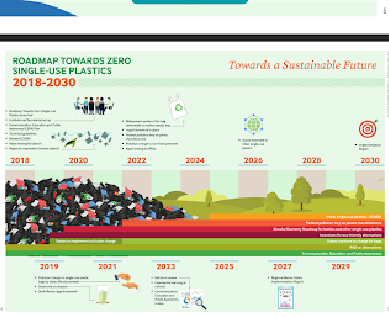Why Non-Woven Bags Are the Sustainable Choice Over Plastic Bags

Plastic pollution has become a critical environmental issue, especially in Malaysia, where over 40kg of plastic waste per capita was generated in 2024 alone. This growing crisis poses significant threats to ecosystems, overwhelms waste management systems, and impacts public health.
To combat this issue, the Malaysian government has implemented a comprehensive roadmap aimed at reducing plastic waste, emphasising the elimination of single-use plastics and encouraging sustainable alternatives.
As part of this plan, a nationwide ban on plastic bags in the retail sector will take effect by 2025, marking a significant step toward reducing plastic pollution. Consequently, non-woven bags have emerged as a popular choice for businesses and consumers alike. These durable, reusable, and eco-friendly alternatives to single-use plastic bags offer a practical and sustainable solution to reducing plastic waste while aligning with environmental goals.
Consequently, non-woven bags have emerged as a popular choice for businesses and consumers alike. These durable, reusable, and eco-friendly alternatives to single-use plastic bags offer a practical and sustainable solution to reducing plastic waste while aligning with environmental goals.
What is a Non-Woven Bag?

Non-woven bags are eco-friendly and reusable bags made from polypropylene, a type of thermoplastic polymer. Unlike traditional woven fabrics, non-woven materials are created by bonding fibres together through heat, chemical, or mechanical processes rather than weaving or knitting.
These bags are widely used as an alternative to single-use plastic bags due to their durability, reusability, and lower environmental impact. Available in various shapes, sizes, and designs, non-woven bags cater to diverse needs, including shopping, promotional giveaways, and packaging.
With the added advantage of customisability, these bags allow businesses to enhance brand visibility while demonstrating their commitment to sustainability, creating a lasting positive impression on customers. Beyond replacing plastic, non-woven bags offer practical benefits that make them indispensable for both personal and professional use.
Benefits on Non-Woven Bags
Non-woven bags have gained popularity as a sustainable alternative to single-use plastics, offering a host of practical and environmental benefits. Their growing use highlights a shift toward more eco-conscious practices, catering to the needs of individuals and businesses alike
1. Durable and Reusable
Non-woven bags are designed to be strong and long-lasting, making them ideal for repeated use. Their sturdy construction can carry heavier loads without tearing, offering a reliable alternative to single-use bags.
2. Lightweight and Convient
Despite their durability, non-woven bags are lightweight and easy to carry. Their compact design allows them to be folded and stored conveniently when not in use.
3. Eco-Friendly Alternative
Made from recyclable polypropylene, non-woven bags help reduce plastic waste and environmental pollution. Their reusability lowers the demand for single-use plastics, contributing to a cleaner planet.
4. Cost Effective in the Long Term
While the upfront cost of non-woven bags may be slightly higher than plastic bags, their durability and reusability make them a more economical choice for businesses and consumers over time.
Additionally, in Malaysia, where a 20-cent charge is imposed on plastic bags in many areas, switching to reusable bags like non-woven options can lead to significant savings for regular shoppers and demonstrate a commitment to environmental sustainability.
5. Versatile for Various uses
Non-woven bags are suitable for a wide range of applications, including shopping, packaging, and promotional events. Their versatility makes them a practical choice for different industries and purposes.
6. Customisable for Branding
Non-woven bags can be easily customised with logos, slogans, or designs, making them effective marketing tools. Businesses can enhance brand visibility while showcasing their commitment to sustainability.
7. Stylish and Aesthetic Appeal
Available in various colours, sizes, and designs, non-woven bags offer a more visually appealing alternative to plain plastic bags. They can be tailored to suit personal preferences or specific branding needs.
8. Reduction in Plastic Waste
By replacing single-use plastic bags, non-woven bags help decrease the volume of waste in landfills and oceans. Their reusable nature reduces the overall production and disposal of harmful plastics.
9. Lower Carbon Footprint
The reusable and recyclable qualities of non-woven bags reduce the energy and resources needed for production, transportation, and waste management, leading to a smaller carbon footprint.
10. Encouraging Sustainable Practices
The use of non-woven bags encourages both businesses and consumers to adopt more sustainable habits. Businesses can demonstrate corporate social responsibility, while consumers are inspired to shift toward environmentally friendly lifestyles.
Applications and Uses of Non-Woven Bags
From bustling retail stores to eco-conscious households, non-woven bags have become indispensable across industries and in daily life. Their versatility, durability, and sustainability make them a go-to choice for countless practical applications.
Industries that Benefit from Non-Woven Bags
1. Retail Industry
Supermarkets, clothing stores, and grocery shops use non-woven bags due to their strength and reusability.
2. Event Management
Non-woven bags are often used as event souvenirs or merchandise carriers at conferences, weddings, and trade shows, making them ideal for distributing materials, giveaways, and branded merchandise.
3. Corporate and Marketing Campaigns
Companies leverage non-woven bags as promotional tools, printing their logos and designs to create a lasting brand impression during campaigns or as part of corporate gifting strategies.
4. Educational Institutions
Schools, colleges, and universities use non-woven bags to package books, study kits, or event supplies, offering a durable and reusable solution for students and attendees.
5. Pharmaceutical and Healthcare
Pharmacies and hospitals use non-woven bags to package and distribute medications and healthcare products, ensuring safe and clean transportation.
6. Hospitality and Tourism
Hotels, resorts, and spas offer non-woven bags as laundry bags or welcome kits for guests, aligning with their sustainability goals.
Everyday Uses for Consumers
1. Shopping and Grocery Bags
Consumers use non-woven bags for their regular shopping trips due to their lightweight yet sturdy design, capable of carrying heavy items without tearing.
2. Reusable Tote Bags
Non-woven bags serve as stylish and reusable totes for carrying books, gym essentials, or other daily items.
3. Gift Wrapping or Packaging
Their durability makes them suitable for storing household items, toys, or clothes, keeping them organised and protected.
4. Storage Solutions
Non-woven bags are a creative alternative to traditional gift wrapping, offering a reusable and eco-friendly packaging option for presents.
5. Picnics and Travel
Non-woven bags are great for carrying food, snacks, or other essentials during picnics and trips, thanks to their portability and ease of cleaning.
Your Go-To Versatile Bags Made With Ethically Sourced Materials
Advantages of Non-Woven Bags Over Plastic Bags
The growing shift toward sustainable products has positioned non-woven bags as an ideal alternative to plastic bags. From long-term cost savings to enhanced customisability, these bags are redefining the standards of sustainability and functionality. The table below provides a detailed comparison of the two.
|
Feature |
Non-Woven Bag |
Plastic Bags |
|---|---|---|
|
Biodegradability |
Not fully biodegradable but recyclable |
Non-biodegradable and contributes to landfill overflow |
|
Durability |
Strong and reusable for multiple uses |
Thin and prone to tearing |
|
Lifespan |
Reusable for months or years |
Single-use; lasts a short time before disposal |
|
Environmental Impact |
Recyclable and eco-friendly |
Non-biodegradable, contributes to pollution |
|
Cost Over Time |
Cost-effective due to reusability |
Cheaper upfront, but requires frequent replacement |
|
Customisability |
Easily customisable for branding |
Limited customisation options |
|
Compliance with Policies |
Meets sustainability regulations |
Increasingly restricted by bans |
Why Non-Woven Bags Are the Future
Non-woven bags have emerged as a cornerstone of sustainable practices, gaining momentum as an eco-friendly alternative to plastic bags. Their rising popularity is driven by a combination of government initiatives, evolving consumer preferences, and their inherent practicality.
1. Government Regulations Supporting Non-Woven Bags
Governments worldwide, including Malaysia, are taking active steps to combat the devastating effects of plastic pollution. Policies such as bans on single-use plastic bags, plastic taxes, and incentives for sustainable alternatives are encouraging businesses and consumers to shift toward reusable options like non-woven bags.
With Malaysia's nationwide plastic bag ban now in motion this year, the call to adopt eco-friendly alternatives has become urgent. Non-woven bags emerge as a practical and compliant replacement for traditional plastics.
2. Consumer Trends Toward Eco-Friendly Products
As awareness of environmental issues grows, consumers increasingly prioritise eco-friendly products in their daily lives. Modern consumers prefer brands that demonstrate a commitment to sustainability, and non-woven bags serve as a tangible representation of these values.
This trend not only boosts their appeal but also allows businesses to enhance brand loyalty and trust while meeting the expectations of an increasingly eco-conscious customer base.
3. Practical and Sustainable Design
Non-woven bags combine functionality with environmental responsibility, offering durability, reusability, and customisation options. Their ability to balance practicality with eco-consciousness ensures they remain relevant and desirable in both the retail and corporate sectors.
This trend not only boosts their appeal but also allows businesses to enhance brand loyalty and trust while meeting the expectations of an increasingly eco-conscious customer base.
Conclusion
The urgency to transition away from single-use plastics has never been greater. With governments like Malaysia taking decisive steps to curb plastic pollution and consumers demanding sustainable solutions, the time to act is now.
Non-woven bags represent a critical first step in reducing our dependence on plastics. Their durability, reusability, and environmental benefits make them an essential choice for individuals and businesses striving for a greener future.
This trend not only boosts their appeal but also allows businesses to enhance brand loyalty and trust while meeting the expectations of an increasingly eco-conscious customer base.
Need a Non-Woven Bag of Your Own?
At Viazan Print, we take pride in providing high-quality non-woven bags tailored to meet your needs. As our best-selling product, these bags are not only durable and reusable but also customisable for your branding and promotional purposes. Whether for retail, events, or everyday use, our non-woven bags are the perfect choice for combining practicality with sustainability.
Join the growing movement toward sustainability and make a difference today. Explore our range of non-woven bags and take the first step toward reducing plastic waste.
Contact us now to find out how we can help you make the switch to a greener future!
Non-woven bags represent a critical first step in reducing our dependence on plastics. Their durability, reusability, and environmental benefits make them an essential choice for individuals and businesses striving for a greener future.
This trend not only boosts their appeal but also allows businesses to enhance brand loyalty and trust while meeting the expectations of an increasingly eco-conscious customer base.
FAQs
1. Is a Paper Bag Better Than a Non-Woven Bag?
While paper bags are often perceived as eco-friendly, they have some limitations compared to non-woven bags. Here’s how they differ:
|
Feature |
Non-Woven Bag |
Paper Bag |
|---|---|---|
|
Durability |
Extremely durable, can carry heavy loads without tearing |
Prone to tearing, especially when wet |
|
Reusability |
Designed for multiple uses; lasts months or years |
Typically single-use |
|
Environmental Impact |
Recyclable and reusable; lower overall impact due to reusability |
Biodegradable but requires more water and energy to produce |
|
Water Resistance |
Moderately water-resistant |
Not water-resistant |
|
Versatility |
Customisable with logos, designs, and colours |
Limited customisation options |
While paper bags are biodegradable and offer some eco-friendly benefits, non-woven bags provide greater durability, reusability, and long-term sustainability. For businesses and individuals aiming to reduce waste and promote a greener future, non-woven bags are the superior choice.
2. What Are the Maintenance Requirements for Non-Woven Bags?
Non-woven bags are low-maintenance and designed for durability, but proper care can extend their lifespan significantly. Here are some tips to keep them in good condition:
- Cleaning:
- Wipe down the bag with a damp cloth for everyday cleaning.
- For deeper cleaning, gently hand wash with mild soap and water, avoiding harsh detergents that may damage the material.
- Drying
- Air-dry the bag completely before storing it to prevent mould or mildew.
- Avoid machine drying, as high heat can warp or damage the polypropylene fibres.
- Storage
- Store the bags in a cool, dry place to prevent exposure to excessive moisture or sunlight, which may weaken the material over time.
- Fold or roll the bags neatly to save space and maintain their shape.
- Avoid Overloading
- Stick to the recommended weight capacity to prevent strain on the seams and handles, ensuring long-term durability.
- Handling
- Keep the bags away from sharp objects or extreme heat, which can cause tears or melt.
3. How much weight can non-woven bags hold?
Non-woven bags are strong and durable, typically holding 5 to 15 kilograms, depending on their thickness and design. Heavy-duty options with reinforced handles can support up to 20 kilograms or more, making them ideal for heavier loads.
For the best performance, choose bags suited to your needs and avoid overloading. At Viazan Print, we offer a range of non-woven bags designed to meet various weight requirements. Explore our collection to find the perfect bag for your needs!
4. Can Non-Woven Bags Be Composted?
Non-woven bags are typically made from polypropylene, a type of plastic, and are not biodegradable or suitable for composting. However, they are recyclable and designed for multiple uses, making them a more sustainable option than single-use plastic bags.
For eco-conscious users, the focus should be on reusing non-woven bags as much as possible and recycling them properly when they are no longer usable. This helps minimise their environmental impact.
For the best performance, choose bags suited to your needs and avoid overloading. At Viazan Print, we offer a range of non-woven bags designed to meet various weight requirements. Explore our collection to find the perfect bag for your needs!
5. Are Non-Woven Bags Safe for Food Storage?
Non-woven bags are generally safe for carrying packaged or dry food items, such as groceries, fruits, and vegetables. However, because they are made from polypropylene, they may not be ideal for direct contact with unwrapped or wet food unless explicitly labelled as food-grade.
Tips for Using Non-Woven Bags for Food Storage:
- Check for Food-Grade Certification: If you intend to use non-woven bags for direct food contact, ensure they meet food safety standards.
- Clean Regularly: Wash or wipe down the bag to maintain hygiene, especially when carrying fresh produce or items prone to spills.
- Avoid Prolonged Storage: While non-woven bags can be used for transporting food, they may not be suitable for long-term food storage.
For safe and hygienic use, prioritise proper cleaning and use food-safe liners when necessary. Non-woven bags are best suited for transporting packaged or pre-wrapped food items.

